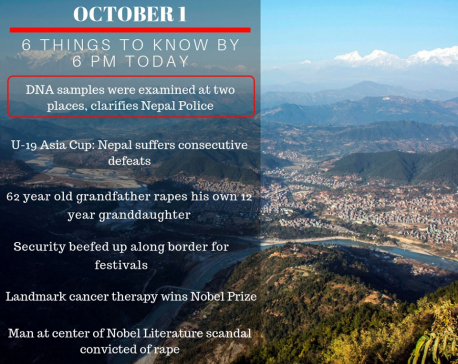
OR
Today is the third day of Chhath—the major festival celebrated in Nepal’s Tarai plains but whose popularity and fame is spreading across the country in the recent years. Chhath is also special in many ways. First of all, the festival is an occasion for prayers and fasting, for the good of the family, humanity and mother earth. Animal sacrifice has no room in it. People fast for three days and offer prayers and offerings to the Sun, expressing gratitude for bestowing the bounties of life on earth. The rituals—holy bathing, fasting, abstaining from drinking, standing in water for long periods of time, offering prayers to the setting and rising sun—are rigorous and are observed over a period of four days. Chhath, in this sense, is also the festival of purity that places peace and harmony above all else.
Chhath was considered to be a festival of only Madhesis until the recent past, or at least many perceived it to be so. But years of acculturation between the hills and plains and intermingling of people of hills and plains has made it a festival of all Nepalis. This indeed is a matter of celebration for the country characterized by cultural and linguistic diversity. In the Tarai plains, people of hill origin celebrate this festival as much as those from the plains. And in Kathmandu Valley, celebrations take place in major river banks decorated with flowers and colors. Such celebrations mean a lot in a culturally diverse Nepali society. They provide a bond of unity for people and bring an occasion for people to understand, respect and regard each other’s culture.
Our constitution has recognized diversity of culture and religion. And the state has recognized almost every religious and cultural event—from Christmas to Id—by granting official holidays on those special days. Yet, certain festivals still seem specific to certain regions and they are celebrated by one particular community. In this context, the provincial and local governments can play a crucial role in widening the respectability and wider acceptability of festivals. Country becomes culturally rich when the communities therein own up and regard each other’s festivities. This develops cultural bonding among people and unites them. With Chhath, this process has started. It has manifested in people of different geographic origins celebrating the festival, considered to be of the plains, with enthusiasm. Chhath has become a cultural symbol of unity among Nepalis. We as a nation need to consolidate this process by owning up, recognizing and regarding every cultural festival marked in the country. On this note, we express happy Chhath to all.
You May Like This

Security to be tightened in capital during festivals
KATHMANDU, Nov 7: In view of festivals--Tihar, Nepal Sambat and Chhath, security will be tightened across the market in the... Read More...

Route permit open from today
KATHMANDU, Oct 10: The Department of Transport Management has opened route permit for public vehicles from today. ... Read More...

OCT 1: 6 things to know by 6 PM today
Your daily dose of missed important news of the day. ... Read More...



Just In
- World Malaria Day: Foreign returnees more susceptible to the vector-borne disease
- MoEST seeks EC’s help in identifying teachers linked to political parties
- 70 community and national forests affected by fire in Parbat till Wednesday
- NEPSE loses 3.24 points, while daily turnover inclines to Rs 2.36 billion
- Pak Embassy awards scholarships to 180 Nepali students
- President Paudel approves mobilization of army personnel for by-elections security
- Bhajang and Ilam by-elections: 69 polling stations classified as ‘highly sensitive’
- Karnali CM Kandel secures vote of confidence















Leave A Comment